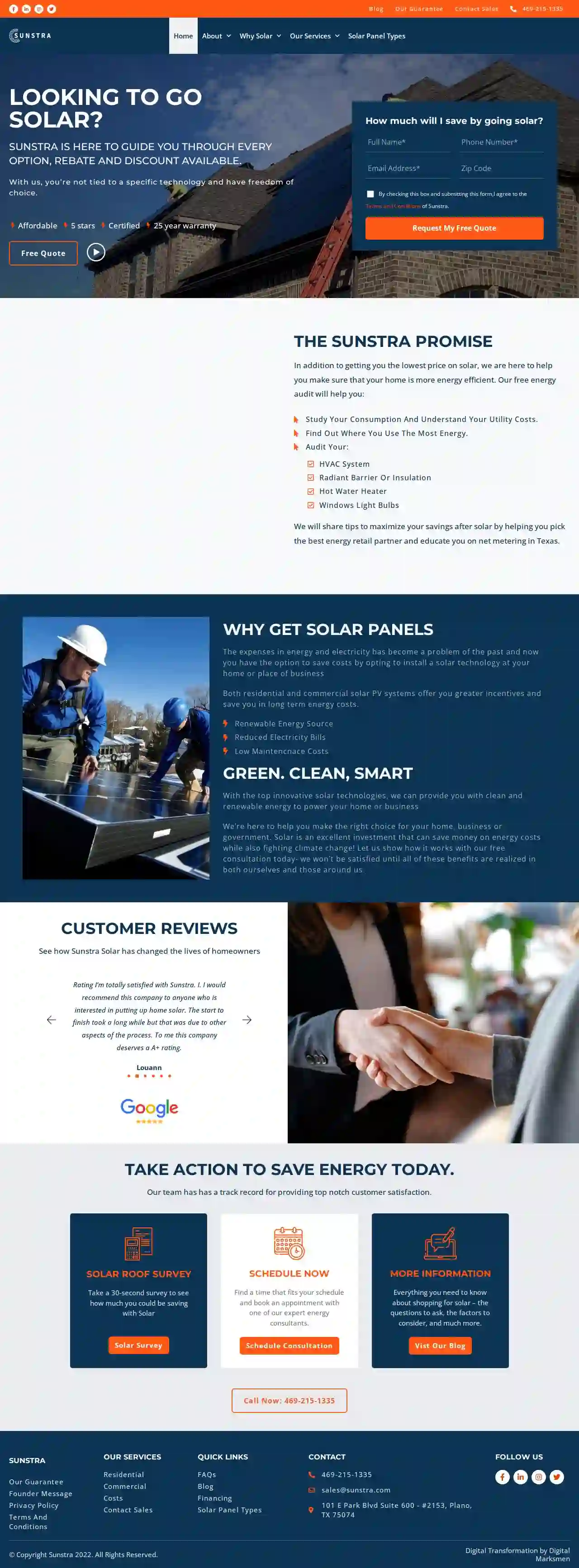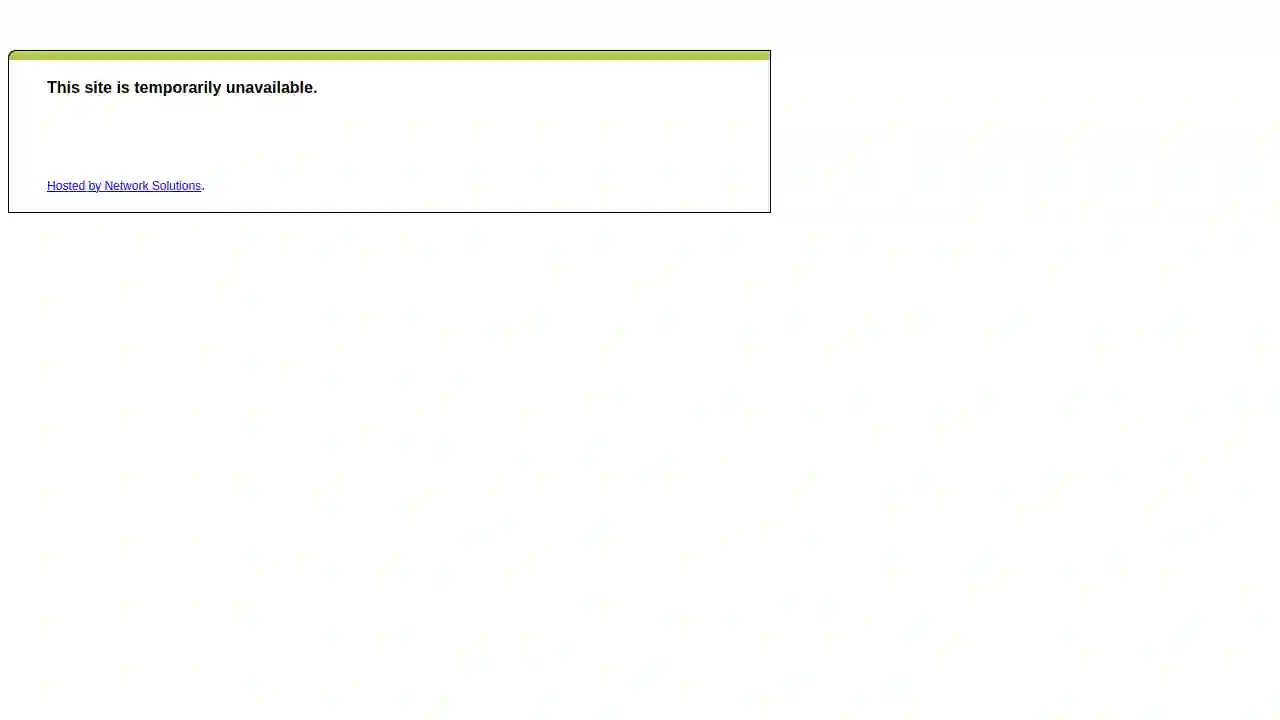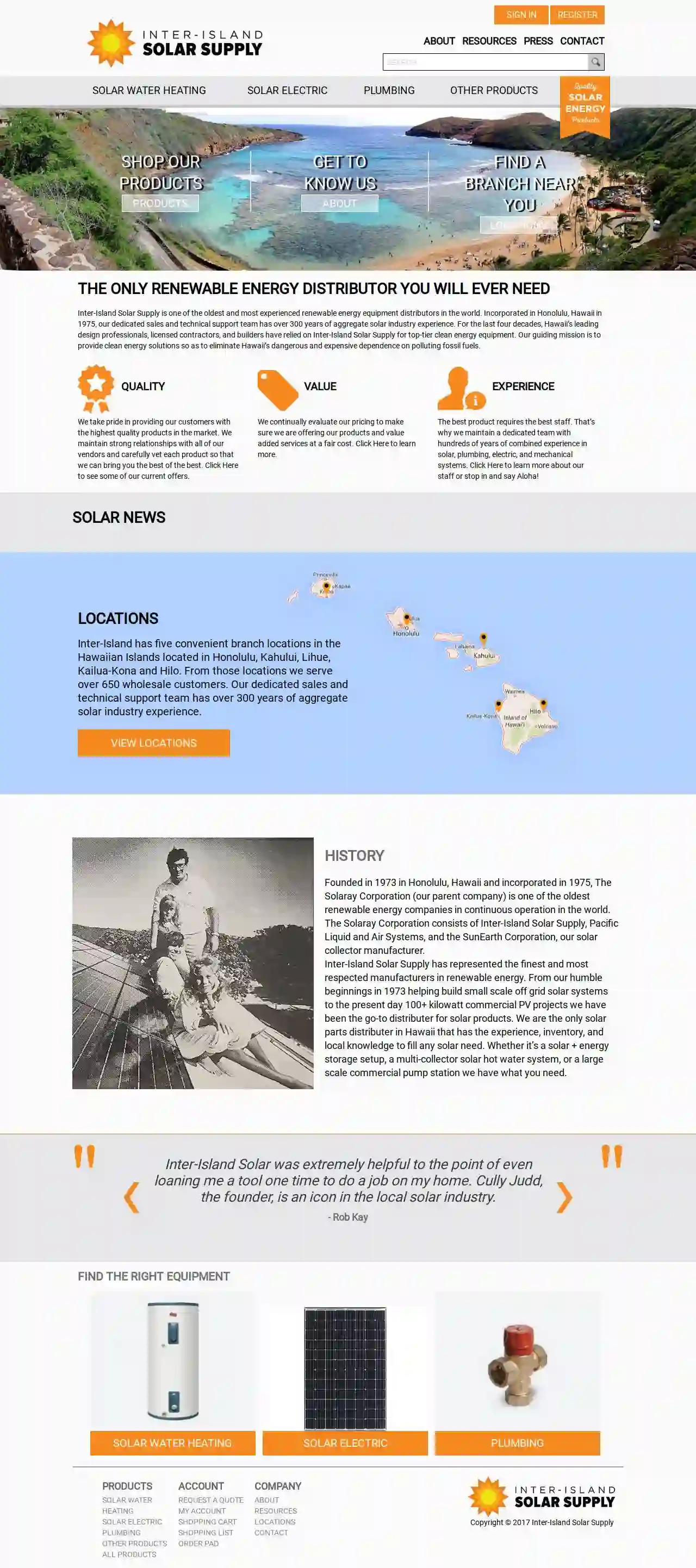Solar Installers Bedford
Find the best Solar Installers in Bedford
Receive 3 FREE Solar Company quotes for your project today! Compare profiles, reviews, accreditations, portfolio, etc... and choose the best offer.

Delta Solar Power
4.9239 reviewsSan Antonio, USDelta Solar Power is a company that aims to create a strong bond between the company and its customers. They understand that change is not always easy and have been helping homeowners make the easy transition to cleaner, more affordable solar energy since 2013. Their mission is to achieve customer bonding through transparency, integrity, and service to their customers with the goal of helping them to win by installing the best system for their needs.
- Services
- Why Us?
- Gallery
Get Quote
Pure Energy
4.992 reviewsLubbock, Texas, United States, 5714 40th Street, 79407, USPure Energy Lubbock is the premier installer of premium quality solar systems in Lubbock, Texas. Founded in 2014 by Justin Griffith, the company has grown exponentially in size and reputation. Pure Energy is committed to providing the best customer experience and has invested heavily in support and customer care resources. In 2024, Pure Energy broadened its offerings to include roofing and electricity services in the Lubbock area.
- Services
- Why Us?
- Accreditations
- Our Team
- Testimonials
- Gallery
Get Quote
SolarWinds
4.252 reviewsBuilding 400, Austin, TX, 7171 Southwest Parkway, 78701, USSolarWinds is a company founded by IT professionals who aim to solve complex problems in the simplest way. Since 1999, they have been relentlessly listening to their customers to understand the challenges they face. Their digital agility solutions are designed to help companies of any size accelerate business transformation today and into the future.
- Services
- Why Us?
- Accreditations
- Our Team
- Testimonials
- Gallery
Get Quote
Sunstra
529 reviews101 E Park Blvd Suite 600 - #2153, Plano, 75074, USSunstra is a solar energy company that offers a variety of services including residential and commercial solar panel installations, solar panel types, and financing options. They provide a 25-year warranty on their solar panels and offer free energy audits to help customers understand their energy consumption and potential savings. Sunstra also offers a promise to help customers maximize their savings after installing solar panels by providing tips on choosing the best energy retail partner and educating them on net metering in Texas.
- Services
- Why Us?
- Accreditations
- Our Team
- Testimonials
- Gallery
Get Quote
North Texas Solar
4.635 reviews1452 Hughes Road, Suite 200, Grapevine, 76051, USNorth Texas Solar, LLC is a locally owned and operated solar energy company that has been serving the Dallas – Fort Worth area since 2015. Their mission is to educate people on the benefits of solar, including potential electric savings, solar tax credits, and utility rebates. They work with all local utilities including Oncor, Coserv, Denton Municipal Electric, and most other local Co-ops. They offer affordable prices and zero down payment options available, and they customize your solar panel system to meet your needs.
- Services
- Why Us?
- Accreditations
- Our Team
- Testimonials
- Gallery
Get Quote
Solur Power
510 reviews3903 US-83 BUS Ste C, McAllen, TX 78501, 78501, USSolur Power is a solar energy company that helps homeowners save thousands on their electric bill. They offer customized plans and quotes for homes to ensure the best solar installers in the area. Their team of solar power consultants are located in McAllen and San Antonio and help homeowners find the best in-class solar installers. They review utility bills and design customized plans and quotes for homes to ensure the best solar installers in the area.
- Services
- Why Us?
- Accreditations
- Our Team
- Testimonials
- Gallery
Get Quote
Energy Pro Hawaii
Austin, USThis site is temporarily unavailable. Hosted by Network Solutions.
- Services
- Why Us?
- Gallery
Get Quote
KNS Solar
4.615 reviews6363 Richmond Ave, suite 205, 6363 Richmond Ave suite 205, Houston, 77057, USKNS Solar is a strategic international energy and project development corporation, headquartered in Houston, Texas, with a combined experience of more than 16 years in developing power generation, renewable energy and innovative green energy products. We use industry leading technology to maximize ROI (return on investment) and longevity of renewable energy system and we are very proud to source all products from the U.S.A to achieve domestic content levels much higher than required. We are dedicated to provide complete solar solutions for rural electrification, C&I, farming, private, government and nonprofit. The core mission focuses on seeding and developing clean energy and infrastructure projects in rural area as we are a renewable energy company specialized in Engineering, Procurement, Construction and Installation of solar hybrid and off grid systems.
- Services
- Why Us?
- Accreditations
- Our Team
- Testimonials
- Gallery
Get Quote
South Texas Solar Systems
3.750 reviewsN/A, USSouth Texas Solar Systems Inc. is a leading provider of solar energy solutions in Texas. With over 11 years of experience in residential and commercial solar, STSS has completed more than 4000 projects. Their mission is to be the leader in the conversion process from a carbon-based energy system to a sustainably based energy system by providing businesses, individuals, and governments utility costs savings through the implementation of the leading solar energy, building automation, and energy control solutions. STSS offers high-efficiency solar panel systems, commercial solar panels, residential solar panels, and off-grid solar systems. They also provide maintenance services for broken systems and ensure that all solar panels are designed to withstand hail and other forms of bad weather.
- Services
- Why Us?
- Accreditations
- Our Team
- Testimonials
- Gallery
Get Quote
Inter-Island Solar Supply
56 reviews123 Solar Street, Suite 100, Beverly Hills, 90210, USSolar Supply is a leading provider of solar water heating, solar electric, plumbing, and other products. Our mission is to provide high-quality, reliable, and efficient solutions for our customers. We have a team of experienced professionals dedicated to ensuring customer satisfaction and providing excellent service. Our products are designed to meet the needs of both residential and commercial clients, offering a range of options to suit different requirements. We are committed to sustainability and helping our customers reduce their carbon footprint.
- Services
- Why Us?
- Accreditations
- Our Team
- Testimonials
- Gallery
Get Quote
Over 4,210+ Solar Companies on our directory
Our solar contractors operate in Bedford & surroundings!
SolarCompaniesHub has curated and vetted the Best Solar Installers in Bedford. Find a trustworthy pro today.
Frequently Asked Questions About Solar Installers
- Use a Directory Like SolarCompaniesHub: We connect you with pre-screened, qualified solar installers in your area.
- Check Online Reviews: Look for positive reviews on Google, Yelp, and other reputable sources.
- Ask for Referrals: Get recommendations from friends, family, or neighbors who have gone solar.
- Verify Credentials: Ensure the installer is licensed, insured, and certified by reputable organizations (e.g., NABCEP in the US).
- Get Multiple Quotes: Compare quotes from at least 3-4 installers to find the best value for your project.
- Ask Questions: Don't hesitate to ask installers about their experience, warranties, and the process they follow.
- Adequate Sunlight: Unobstructed sunlight for a significant portion of the day.
- Sufficient Space: Enough space to accommodate the desired number of panels.
- Structural Integrity: A strong roof structure capable of supporting the weight of the panels.
- Appropriate Orientation and Tilt: Ideally, the roof should face south (in the Northern Hemisphere) or north (in the Southern Hemisphere) with a tilt angle close to the latitude of your location. However, other orientations and tilts can still be effective.
- System size
- Roof complexity
- Weather conditions
- Permitting and inspections
- Installer's schedule
How do I find a good solar installer near me?
How do I know if my roof is suitable for solar panels?
How long does it take to install solar panels?
What happens if my roof needs to be replaced after I install solar panels?
How do I find a good solar installer near me?
- Use a Directory Like SolarCompaniesHub: We connect you with pre-screened, qualified solar installers in your area.
- Check Online Reviews: Look for positive reviews on Google, Yelp, and other reputable sources.
- Ask for Referrals: Get recommendations from friends, family, or neighbors who have gone solar.
- Verify Credentials: Ensure the installer is licensed, insured, and certified by reputable organizations (e.g., NABCEP in the US).
- Get Multiple Quotes: Compare quotes from at least 3-4 installers to find the best value for your project.
- Ask Questions: Don't hesitate to ask installers about their experience, warranties, and the process they follow.
How do I know if my roof is suitable for solar panels?
- Adequate Sunlight: Unobstructed sunlight for a significant portion of the day.
- Sufficient Space: Enough space to accommodate the desired number of panels.
- Structural Integrity: A strong roof structure capable of supporting the weight of the panels.
- Appropriate Orientation and Tilt: Ideally, the roof should face south (in the Northern Hemisphere) or north (in the Southern Hemisphere) with a tilt angle close to the latitude of your location. However, other orientations and tilts can still be effective.
How long does it take to install solar panels?
- System size
- Roof complexity
- Weather conditions
- Permitting and inspections
- Installer's schedule